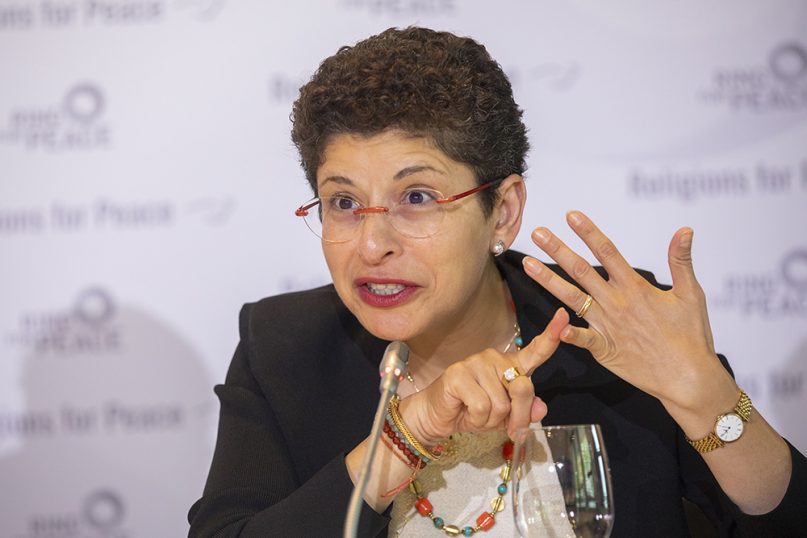(RNS) — Religions for Peace, an international interfaith coalition that advocates for nonviolent solutions to the world’s conflicts, announced in a Friday (June 16) statement that Azza Karam, its secretary general since 2020, has resigned her position.
The organization’s executive committee noted in the statement its “deep gratitude to Prof. Karam for her tireless efforts to strengthen Religions for Peace’s ability to advance multi-religious collaboration in the cause of peace and reconciliation.”
It added that Karam “has led Religions for Peace through a time of major organisational transition and a global pandemic, has actively expanded our networks and partnerships with various United Nations bodies, and played a catalytic role in the creation of the first multi-religious council of leaders within the UNHCR (the UN Refugee Agency).”
Karam and other leaders of the organization couldn’t be reached or declined to comment about the reason for her resignation, which is effective July 1.
She was elected secretary general at the 10th World Assembly of the global coalition in Lindau, Germany, in 2019, marking the first time a woman or a Muslim had been chosen to lead the organization, which was founded in 1970.
Karam previously worked at the United Nations on issues of religion and development and remained a professor at Vrije Universiteit in Amsterdam while leading the interreligious coalition.
RELATED: Religions for Peace made history with its new leader. Then came historic challenges.
Karam, an author and speaker, succeeded William Vendley, who had held the top executive role at Religions for Peace for 25 years.
In her time leading the organization, which is based in New York, Karam spoke out about the inequitable global distribution of COVID-19 vaccines and the takeover of Afghanistan by the Taliban, and she led mpox prevention work with World Health Organization officials.
“We have to remember that every religious leader in Afghanistan is not part of the Taliban,” she told Religion News Service in a 2021 interview. “At a minimum, Afghanistan forces us to be discerning about the different religious roles, responsibilities and influences. We can no longer speak about ‘religion’ in the singular. We have to be more discerning about society, politics and about the different religions coexisting.”
In 2022, Karam worked with leaders of her organization who were working to slow the spread of mpox, previously known as monkeypox, by getting advice out to houses of worship about the disease. She pointed out that leaders of a variety of faiths were employing “theologies of compassion” that had first developed in response to outbreaks of other communicable diseases, such as HIV/AIDS, Ebola and COVID-19.
“There is no shame in having any disease” is their mantra after dealing with past health crises, she said.
Karam also was a signatory, along with other faith community members and academic experts, on the Manresa 2022 Pact, which called for climate improvement measures in cities across the globe.
In its statement about Karam, Religions for Peace said its senior management team will provide interim leadership of the staff until a new secretary general is chosen.
RELATED: Woman chosen to lead Religions for Peace as others urge greater female visibility





